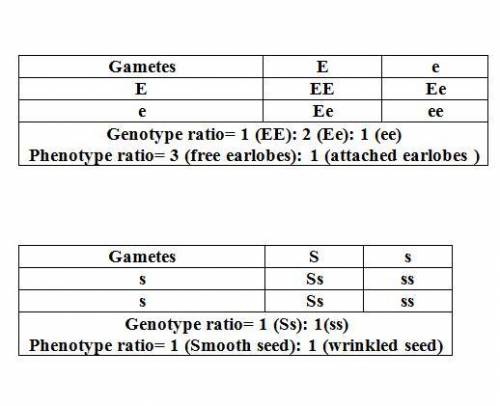
2) use a punnett square to answer the question.
in humans, free ear lobes are dominant over attached ear lobes. two parents who are heterozygous are expecting a child. what is the percentage that the child will have free ear lobes?
punnett
question 2 options:
75%
0%
50%
100%
question 3 (3 points)
question 3 unsaved
use a punnett square to answer the question.
in humans, free ear lobes are dominant over attached ear lobes. two parents who are heterozygous are expecting a child. what is the percentage that the child be homozygous dominant?
punnett
question 3 options:
75%
25%
0%
50%
question 4 (3 points)
question 4 unsaved
use a punnett square to answer the question.
in peas, wrinkled seeds are recessive to smooth seeds. if a homozyous recessive and a heterozygous plant have offspring what will percentage will have smooth seeds?
punn
question 4 options:
50%
0%
25%
75%

Answers: 2


Another question on Biology

Biology, 21.06.2019 21:00
Texas has an impending storm, and california is experiencing a water crisis. match the technologies with the state that can use them to reduce the effects eddies natural hazards. texas is the storm cellar and the wood that is crisscrossed. california is the dam and the storage tanks
Answers: 1

Biology, 21.06.2019 23:00
The tasmanian devil, a marsupial carnivore, is facing extinction due to devil facial tumor disease (dftd) which causes bulging cancerous lumps and lesions to erupt around the face and neck — often causing enough deformation to make seeing or eating difficult. dftd has evolved into a contagious cancer, a trait that is unique among cancers. devil mating behavior involves biting around the head and neck, allowing cells from one individual — especially cells from the crumbly dftd tumors — to be transferred to the wounds or face of a new individual. this marsupial was once found across australia, but sea levels rose, isolating the tasmanian population, while the australian population went extinct. what would be an outcome of genetic isolation that is likely to have impacted the spread of dftd? a) reduced territory puts diseased individuals in greater contact with non-diseased ones. b) inbreeding results in less variation in facial features so the cancer is generally fatal. c) genetic isolation has made it difficult for scientists to develop a vaccine against dftd. d) the lack of genetic variation in the immune system of tasmanian devils minimizes resistance to the disease.
Answers: 3


Biology, 22.06.2019 04:00
The transport tubes from food came down the plant are called?
Answers: 1
You know the right answer?
2) use a punnett square to answer the question.
in humans, free ear lobes are dominant over a...
in humans, free ear lobes are dominant over a...
Questions












Mathematics, 10.03.2020 01:33

Computers and Technology, 10.03.2020 01:33







Computers and Technology, 10.03.2020 01:33




